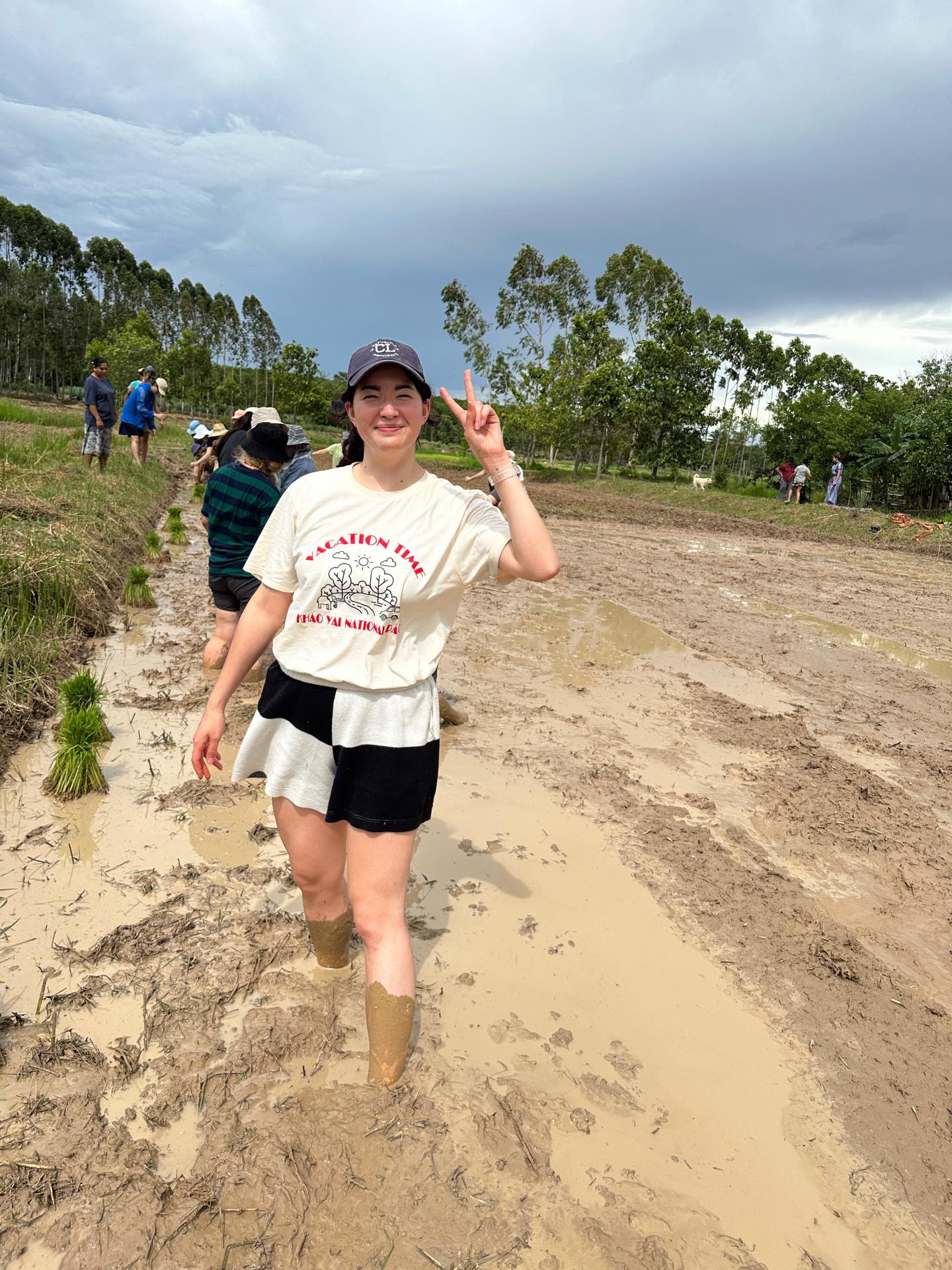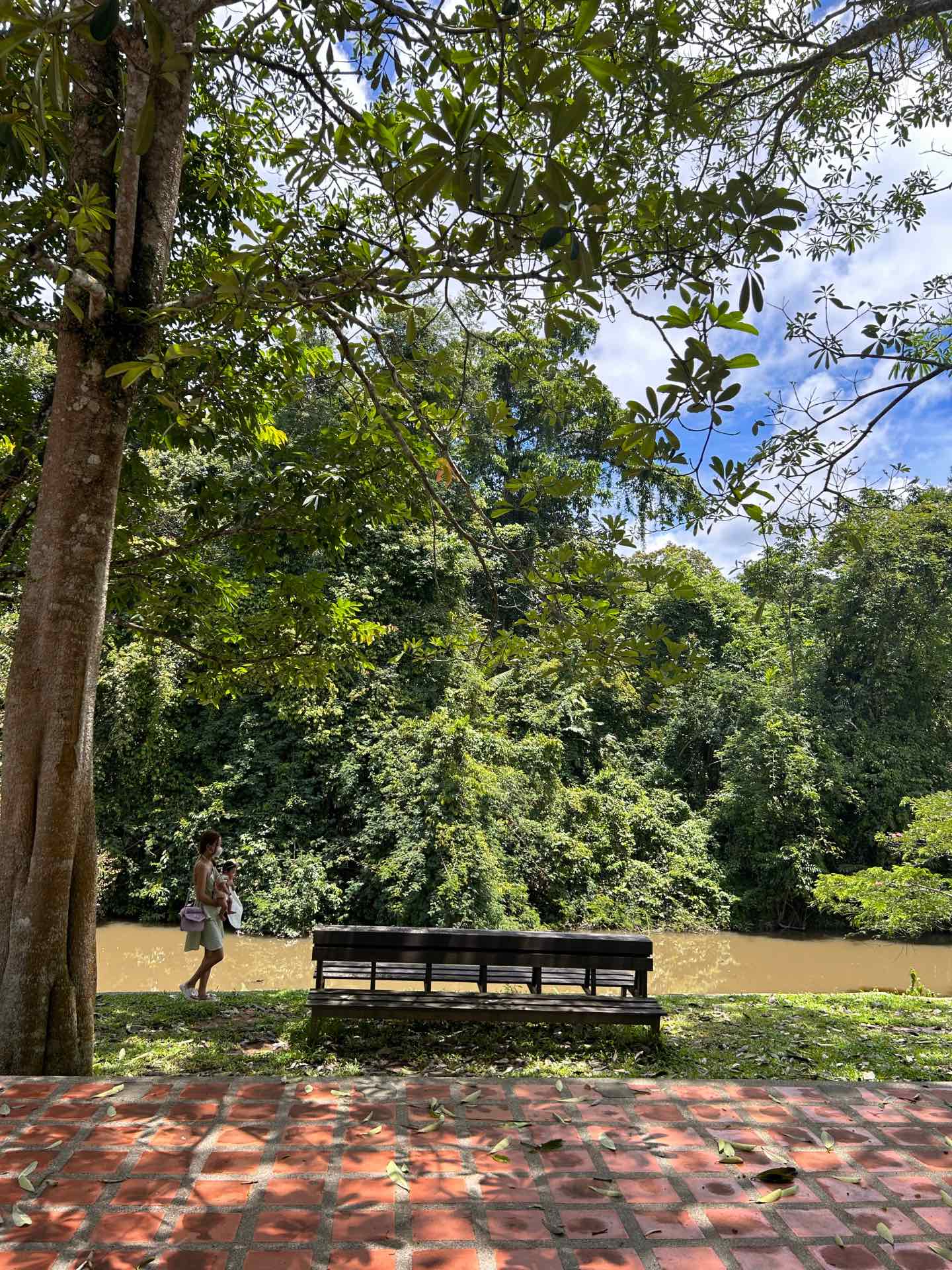Student Reflection
Thailand Student Reflection: Grace Masaoka
 Graduate student Grace Masaoka shares her experiences and memories of the 2023 Earth Expeditions: Thailand course.
Graduate student Grace Masaoka shares her experiences and memories of the 2023 Earth Expeditions: Thailand course.
I have so many thoughts and feelings about our trip that I’m still processing and being reminded of every day. The experiences in Thailand taught me so much, in so many different ways. Being immersed in Thai culture and Buddhism, learning about conservation efforts, getting to explore our own inquiries, and the privilege of seeing hornbill research up close and personal (and the list goes on).
Recurring Theme
A theme that continued to show up throughout the field experience was about opening ourselves up to the nature around us, and tuning into ourselves in general. One of the members of the hornbill research team said this to us before we did a SAM at the hornbill outlook post (I forgot his name, but it was the researcher who had a near-death experience with a gaur). He said “open your senses, eyes, and heart. If you allow yourself to open yourself to nature, you also open your feelings”. We were also encouraged to open ourselves and our senses as we were walking into the forest to go to the hornbill roosting sites. At the Khao Yai National Park waterfall we were prompted to observe nature and reflect on what we learn about our own lives from observing as a reminder that nature shows what is already inside of us. And at Wat Pa Sukato, we again heard similar messages from Phra Paisal. He said, “As humans we learn and pay so much attention to the world, but rarely ever to ourselves and what’s inside”. Hearing these messages not only helped me go into different activities and exercises with a mindset that made the experiences more enriching, it also made me reflect deeply about my own life at home. These messages aren’t messages I’ve ever really heard and have never thought much about myself. In fact I tend to distract myself, purposefully at times, to avoid reflecting about myself and my feelings. In academic contexts especially, I don’t think I’ve ever been encouraged even one time to tune into myself. In thinking about my own resistance to this, I wonder if it’s because I’m scared that if I take the time to really sit with myself that I’ll be overwhelmed with emotions that I haven’t given myself space to process, and that it will be counterproductive. When we did the bean activity in Phra Paisal’s hut, I mentioned to him that I was holding my breath during the activity and he suggested that it is because I was trying to suppress my thoughts instead of just letting them come/being aware of them. By not opening myself up, I am missing out on learning about myself and how I really feel. This was probably one of the most impactful things I learned during the trip.
Since returning from the trip, I’ve been actively working on mindfulness, especially being less resistant to my thoughts/feelings, and paying a bit more attention to what’s going on inside of myself so that I can enjoy the many benefits that mindfulness can provide such as greater well-being and life satisfaction (Schutte & Malouff, 2018). This has also transferred into aiming to do my everyday activities with more awareness and mindfulness, as opposed to being on auto-pilot and doing tasks absent-mindedly (Hanh, 1976). For example, I had a habit of always watching a TV show whenever I was eating at home. Although it’s not necessarily “bad”, I’ve been putting more effort into eating without any distractions or additional stimulation, and just try to simply enjoy my food and be present with what I’m doing.
Impactful Influences
Although everyone we met in Thailand was impactful in their own ways, Vichai was the first person who came to mind while reading this question. Mostly, I was in awe of his multidisciplinary approach to conservation education and engagement. It was inspiring to learn about how he weaved different major life experiences into his current work such as Buddhism, working with the hornbill research team, and artwork. In fact, it reminded me of the triadic framework which integrates nature, communities, and belief systems into one’s identity (Korach & McConnell, 2021). Due to the intersection of nature conservation, community engagement, and Buddhism that he reflects in his work, it has resulted in effective community-based conservation. The relationships he’s built and maintained with different stakeholder groups allows him to create opportunities for stakeholder collaboration, which is a key factor in community-based conservation (van de Water, 2018). Another incredibly impactful influence was the hornbill research team. In addition to the lessons they taught us about opening ourselves up in nature, I also learned a lot about de-centering self, which is a key element of Buddhism (Smith, 1991) which certainly has implications on conservation. While talking with us, the researchers discussed the consequences of viewing oneself as the center: it results in lots of expectations, focus on biases, and wanting to be important. I felt like they really embody the opposite of this, especially after hearing the stories they shared about getting gravely injured from wildlife and being able to not take it personally. As opposed to having egocentric worldviews, it was clear that they viewed themselves as part of nature which has positive implications for conservation (Sponsel & Natadecha-Sponsel, 1993).
Comfort Zone
Though it hardly ever happened, I felt safe and relaxed during the very few times that I was in my comfort zone on the trip. There were a lot of times I felt outside of my comfort zone that were circumstantial such as the physical discomfort of temperature, being constantly dirty and sweaty, showering and sleeping with insects every night, etc. Those factors were out of my control and I didn’t have trouble accepting them, mostly because I fully expected to be pushed outside of my comfort zone in this way and wanted to embrace it. One way that I stepped out of my comfort zone that was within my control, was not using my phone. I intentionally did not purchase a sim card or a bunch of international data, and only got enough to contact my family to let them know I was safe. I wanted to completely check out from my life back home and so I didn’t text anyone, check my email, or go on  social media one single time. While this is not what I’m used to, it honestly felt so liberating! I felt free to really lean into every day of the trip, and this also allowed me time to process my experiences as opposed to distracting myself with stimulation like how I do at home. I am proud of myself for making this choice and sticking with it throughout the trip, because it made my experience incredibly enriching.
social media one single time. While this is not what I’m used to, it honestly felt so liberating! I felt free to really lean into every day of the trip, and this also allowed me time to process my experiences as opposed to distracting myself with stimulation like how I do at home. I am proud of myself for making this choice and sticking with it throughout the trip, because it made my experience incredibly enriching.
Haiku
I regularly practice and exchange haiku with my family, so I thought a haiku would be a fitting form of poetry to include here since they are often used to describe an observation in nature (Hart, 2004). I made this haiku when reflecting on one of the first moments in my Eco Solo experience in the forest. My solo spot was in a bamboo grove, and when I first sat down I felt very uncomfortable and out of place. I was wearing a scarf my mom had lent to me for the trip, and when I wrapped it around my head to protect me from bugs, I smelled my mom’s perfume and it brought upon overwhelming emotions of both homesickness and comfort. It’s amazing how one smell could bring me feelings of home while I was halfway across the world.
In a bamboo grove
A scarf wrapped around my head
It smelled like my mom